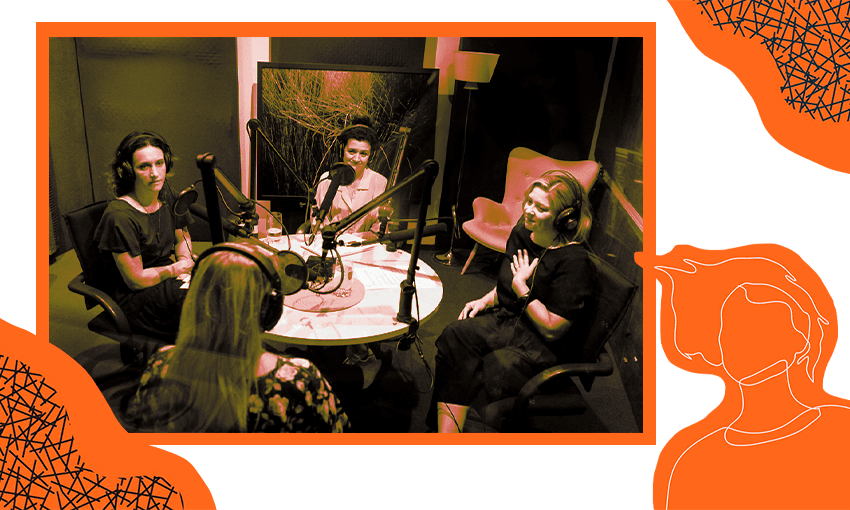There is power in women’s stories and Tell Me About It is a place for them to be told, write the new podcast’s co-hosts, Stuff senior journalists Michelle Duff and Kirsty Johnston.
There’s never been a better time to be a feminist. A deadly pandemic is sweeping the globe. The waves are licking hungrily at coastal properties, which still cost more than your life is worth. The penguins’ days are numbered. Somewhere in Ōtautahi, a dude who was once infringed upon by being served a too-hot latte bashes out 800 words of incoherent nonsense about “freedom” and “rights”. Social media platforms that collapse nuance and reward rage are at risk of turning us all against each other and undermining democracy. The online misogynist cackles.
It all sucks, but there’s never been a better time to be a feminist.
If ever there was a time to get mad at patriarchal and colonial power structures, to wonder why so many women are tearing their hair out being expected to perform at work while homeschooling their children during lockdown, why daycare is so expensive, why single Māori mums are struggling to get rentals and feed their kids, why disinformation is rife with racism, sexism and transphobia, then this is it. This is the time.
There was a point, around the time The Spice Girls were singing ‘Wannabe’, when it was argued that feminists had achieved their goals. In Aotearoa, we had the trifecta of Helen Clark as prime minister, Silvia Cartwright as governor-general, and Sian Elias as chief justice. But this was only ever smoke and mirrors. Even they couldn’t bang on about gender issues too much because of rising male anxiety about women taking over. #MeToo and the worldwide airing of endemic sexual harassment and assault peeled back the veneer. Now, we have Covid, a crisis that has revealed the continued unfairness of whose work is valued and whose is not – and that even though we say “essential” we don’t mean “well paid”.
As reporters, we have written about systemic discrimination against women and minorities for years. Both of us started writing in other areas – Kirsty in education, and Michelle in health – but all roads inevitably led back to one area; inequality. It’s rampant in our society. It’s worse if you’re a woman (we don’t love this binary term but find it’s still useful for a general audience when making gendered impacts clear in our news reporting) and it’s worse again if you’re Māori, Pasifika, Asian or an ethnic minority, trans or gender diverse, disabled, queer, old, poor. It’s layers upon layers.
Around 2018, when Michelle was reporting as part of Stuff’s Me Too team led by Alison Mau and Kirsty was investigating why rapes aren’t reported to police for the New Zealand Herald, we started calling each other. It is generally discouraged for journalists from rival media agencies to do this. But we needed someone else who understood. As we spoke, we found we were echoing the frustrations from the people we’d been speaking to for stories. Why did this feel so hard? We heard from uni students, mothers, lawyers, care workers, actors, doctors, about all the ways the system felt rigged against them, big or small. And some of their stories were funny; there were so many messy, complex intricacies to women’s lives, and so much of what people shared – so many sidetracks, little nuggets of gold – that we couldn’t fit in the pieces that ended up in print. There were themes we were dying to explore.
Everyone wants to make a podcast, right? Our first pitch featured mainly us yarning to each other, with some guests. We could have made this podcast, as we are sure we are hilarious, and maybe people might have listened. But in 2021, this felt increasingly irrelevant. Even the most well-meaning Pākehā feminist has work to do unlearning the deep-seated colonial privilege ingrained in us from birth. And as journalists, it felt like our job to get out of the way. So with the help of producer Noelle McCarthy, we changed our focus to the people at the centre of our stories, and Tell Me About It was born.
From the first guest, we knew it was the right choice. “S”, who went through two trials to bring her rapist to justice, breezed in and matter-of-factly laid out all the ways the system made her feel like she didn’t exist. We cried. We laughed. We got fucking furious, and incredulous, and then the next week we did it all again. Not one woman we’ve asked to come into the studio has said no. On this week’s episode, you’ll hear from Sara and Ratahi, a mother and her teen daughter who drove for hours to be there, so that Ratahi could hear her mum’s story in full for the first time. Over the course of the series, you’ll hear from women who arrange childcare, and hotels, and tell their bosses they have an “appointment” in their lunch break and might be late. They come in, and they share, unfiltered, the most intimate details of the pain – and joy – in their lives.
As journalists, it is a privilege to hear people’s stories. Some of the women who will appear on the podcast are those we’ve spoken to during our reporting, and couldn’t get out of our heads. Some of them we’re meeting for the first time. Some will be at the heart of developing stories, or have played a part in significant events.
There is power in these words, heard together. Collectively, it’s like a raucous house party, a proper high school sleepover, or a primal scream. Sometimes all three at once.
Women are ready to talk. We’re here to listen, and we hope you will be too.
Tell Me About It: Real stories behind the news is available wherever you get your podcasts.




